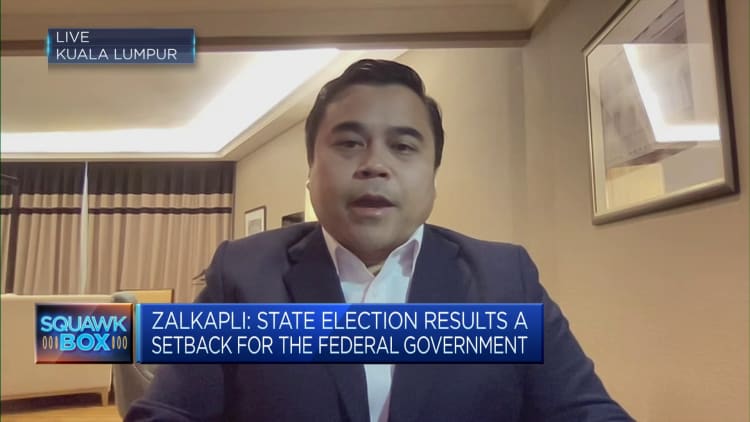Malaysia's closely watched state elections were a "setback" for the ruling coalition government, according to a political analyst from a risk consultancy.
The polls were held in six states on Saturday, and ended in a split result between the ruling and opposition coalitions, with each side retaining control of three states. Still, the conservative opposition coalition was able to make significant inroads gaining popularity among voters.
The contest was widely seen as a first test for Prime Minister Anwar Ibrahim's coalition and unity government that came to power in November. To be clear, the results will not directly impact the Malaysia leader's two-thirds majority in parliament.
"It's a setback simply because they've been selling the narrative that by introducing good governance, they will win back key Malay support in some of the states," Adib Zalkapli, a director with political consultancy Bower Group Asia, told CNBC's "Squawk Box Asia" on Monday.
"But what we saw over the weekend is the same thing that happened last November, where the coalition failed to win crucial Malay votes — it happened again."

Anwar's progressive Pakatan Harapan coalition and its ally Barisan Nasional retained Selangor, Negeri Sembilan and Penang, according to official results from the Election Commission.
The opposition Perikatan Nasional coalition, led by former Prime Minister Muhyiddin Yassin and backed by a conservative Islamic party, retained Kelantan, Kedah and Terengganu. The opposition was able to build on the inroads it had made among the country's majority ethnic-Malay Muslims.
This is the time for everyone, for all the parties, whether they win or lose, to work together to protect national peace, raise the dignity of the country and concentrate on developing Malaysia.Anwar IbrahimMalaysia Prime Minister
The rise of a strong opposition in Malaysia was a sign of the "maturing process" of the country's democracy, noted Zalkapli.
"Perikatan Nasional, having made up of former experienced leaders, former prime ministers — they managed to form a formidable coalition to challenge the federal government," he said.
The opposition's ability to present itself as "a brand new political party" appealed to a lot of young voters, he added.
"Also do not discount the fact that they have Islamic appeal, especially among young Muslim voters, who are becoming more religious."
'Silver lining'
At a news conference after the polls, Anwar said the government remained strong and urged all sides to accept the people's decision.
"This is the time for everyone, for all the parties, whether they win or lose, to work together to protect national peace, raise the dignity of the country and concentrate on developing Malaysia," he said.
Since coming to power, Anwar — who campaigned for 24 years for the top job in Malaysia amid political coups and jail sentences — pledged to make economic reforms his top priority.
There's a "silver lining" for Anwar's coalition government, Zalkapli said, given the latest polls helped to maintain the political status quo.
"With the state elections over, Anwar's hands are in a way no longer tied, he could potentially push his reform agenda," he said.
"The next election is not due until four years, he has time on his side and he's not facing any political tests in the near future."

